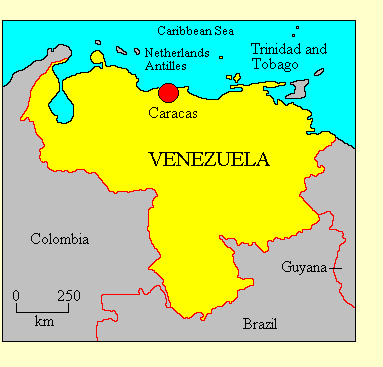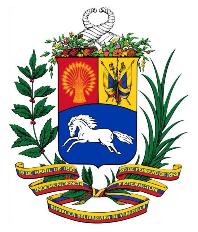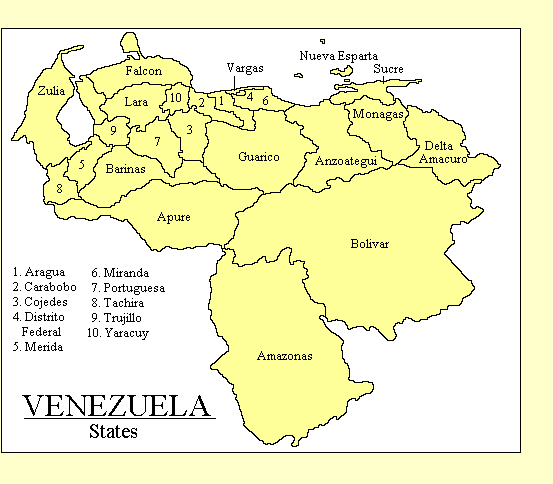

BOLIVARIAN REPUBLIC
OF VENEZUELA
• Official name: Republica Bolivariana de Venezuela (Bolivarian Republic of Venezuela)
• Location: South America
• International organisations: Andean Community, Non-Aligned Movement, Organisation of American States,
Organisation of Petroleum Exporting Countries, United Nations, World Trade Organisation
• Borders: Brazil, Colombia, Guyana
• Coastline: Caribbean Sea
• Land area: 912,050 Km2
• Population: 26,800,000
• Annual GDP (PPP) per capita: US$13,100 (2009 CIA estimate). World ranking: 67
• Ethnicity: Over 65% of Venezuelans are of mixed ethnic descent, either mestizo (European-Amerindian) or
mulatto (European-African). About 20% of purely European (mostly Spanish) descent, while about 10% are of
purely African descent. Some Amerindian communities survive in the interior.
• Languages: Spanish is the official language and is almost universally understood.
• Religion: Over 95% of the population are at least nominally Catholic Christians.
• Form of government: Presidential democratic republic. Venezuela is divided into 23 provinces, one
Federal District and one federal dependedency.

• Capital: Caracas
• Constitution: The Constitution of the
Bolivarian Republic of Venezuela came into effect on 30 December 1999.
• Head of state: The President, elected by direct universal suffrage for a six-year term.
• Head of government: The President, who appoints the members of the Cabinet.
• Legislature: Venezuela has a unicameral legislature. The
National Assembly (Asamblea Nacional) has 167 members,
elected for five-year terms by proportional representation from the provinces.
• Electoral authority: The National Election Council administers
national elections.
• Freedom House 2011 rating: Political Rights 5, Civil Liberties 5
• Transparency International Corruption Index: 20% (164 of 178 countries rated)
• Reporters Without Borders Press Freedom 2010 Index: 52.7% (133 of 178 countries rated)
• Heritage Foundation Economic Freedom 2010 Index: 37.6% (175 of 179 countries rated)
Political history
The territory which is now Venezuela was brought under Spanish control in the mid 16th century. From
1718 the area was part of the Viceroyalty of New Granada. In 1777 Caracas became the capital of the Captaincy
General of Venezuela. In 1811 the Caracas elite, led by Venezuela's greatest son, Simon Bolivar, declared the
country independent, although full independence and a stable government were not achieved until 1830.
For a century after independence Venezuela was run by a succession of caudillos (strong men), most of
them agents of the Europeanised coffee-plantation owners. Between 1858 and 1863 there was a civil war between
liberals and conservatives. The climax of the caudillo era was the regime of Juan Vicente Gomez, who held
absolute power from 1908 to 1935.
In 1945 a group of liberal officers seized power and installed Romulo Betancourt as President.
Betancourt's program of liberal reform, including universal franchise and direct elections, was interrupted
by another coup in 1948. General Marcos Perez then ruled as a brutal dictator until 1958, when a revolution
reinstated civilian government and Betancourt returned to power. Since then, despite occasional military
plots and attempts at Communist guerilla campaigns, Venzuela has maintained constitutional government.

Under liberal presidents such as Carlos Andres Perez (1974-79 and 1989-93), Venezuela prospered,
helped by booming oil revenues. But these presidents also ran up huge debts and in the 1990s Venezuela
suffered a severe crash. The result was an attempted coup by radicals in the military in 1992. In 1998 the
coup leader,
Hugo Chavez, was elected president. Resistance to
Chavez's radical policies ("the Bolivarian
revolution") has been fierce and a coup attempt in 2002 nearly succeeded. Chavez was comfortably re-elected
in 2006. In 2007 voters rejected a constitutional referendum that would have entrenched
Chavez's powers and allowed him to run for a third term in 2012. In 2009, however, a second referendum
was held, and approved the abolition of presidential term limits.
Chavez's party, United Socialist Party of Venezuela (PSUV) is a vehicle for
his increasingly autocratic rule. Chavez is also supported by the
Communist Party of Venezuela (PCV). His main rival the liberal grouping
A New Era (UNT), led by Manuel Rosales, who was Chavez's opponent in the 2006 presidential election.
The opposition boycotted the 2006 legislative elections, giving the PSUV and allied parties a monopoly in the
legislature. The opposition returned to the fray in the 2010 elections, and won 47% of the national vote, although
this translated into only a third of the seats in the National Assembly. These elections seem to have been fairly
conducted, despite the ruling party's tight grip on the state machinery and the intimidation of the media.
Freedom House's 2011
report on Venezuela
says: "Venezuela is not an electoral democracy. While the act of voting is relatively free and the count is
fair, the political playing field favors government-backed candidates, and the separation of powers is
nearly nonexistent... The opposition decided to actively contest the 2006 presidential and 2010 National
Assembly elections, and the voting was generally considered free and fair, but the CNE was ineffectual at
limiting use of state resources by Chavez and the PSUV. They enjoyed a massive advantage in television
exposure, and the promotion of social and infrastructure projects often blurred the line between their
official roles and their electoral campaigns. Public employees were also subjected to heavy pressure to
support the government... The government plays a major role in the economy and has done little to remove
vague or excessive regulatory restrictions that increase opportunities for corruption...
Although the constitution provides for freedom of the press, the media climate is permeated by intimidation,
sometimes including physical attacks, and strong anti-media rhetoric by the government is common...
Freedom of peaceful assembly is guaranteed in the constitution, but the right to protest has become a
sensitive topic in recent years... Politicization of the judicial branch has increased under Chavez, and
high courts generally do not rule against the government. Conviction rates remain low, the public-defender
system is underfunded, and nearly half of all judges lack tenure."
Updated November 2011
|

